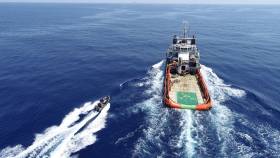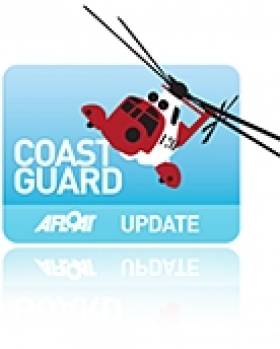Displaying items by tag: merchant vessels
Irish Naval Service Conduct 'Friendly Approaches' In Mediterranean Sea As Part of Operation Sophia
#NavalService - As previously reported on Afloat, LÉ James Joyce last month was deployed to the central Mediterranean to take over Operation Sophia duties which also involve 'friendly approaches'
The Irish Naval Service P60 class Offshore Patrol Vessel (OPV) replaced a sister, LÉ Samuel Beckett which had worked alongside other EU member states navies participating in the migrant mission. Ireland first became involved in Operation Sophia last year.
The core tasks of Operation Sophia / EUNAVFOR -Med is designed to combat and disrupt people-smuggling in addition to saving lives in seas off Libya, north Africa. In addition the role of friendly approaches is included. According to the Naval Service they provide an opportunity of interact face-to-face with members of the merchant vessels’ community who regularly transit in the area of naval operations.
Friendly approaches enable in providing messages on the operation and to collect useful information on what is happening at sea.
Prior to a friendly approach is conducted, the opportunity is at first given as an invitation of the Master of the vessel. In addition the vessels do not form any part of boarder control or inspection process.
The overall level of awareness arising from friendly approaches provides Operation Sophia to be more effective having assessed such operational activity and interacting with merchant ships in a personal manner.
Since the UN arms embargo off the Libyan coast began in 2016, Operation Sophia assets have carried out 117 friendly approaches.
Irish Coast Guard Reveals Spike in Incidents Involving Leisure Activities, Merchant Vessels
The Irish Coast Guard has released statistics revealing a busy summer period and a significant increase certain types of search and rescue incidents.
Most notable is the increase in incidents involving leisure activities such as surfing, diving, and canoeing.
There was also an increase in the number of merchant vessels requiring assistance, which was up approximately 50% on 2010 figures.
Irish Coast Guard director Chris Reynolds said: "We began our safety awareness campaign in May, which was aimed at holidaymakers and members of the public who were planning water sports, enjoying cliff walks or engaging in coastal activities throughout Ireland. We also targeted walkers and climbers.
"Despite the advice and information provided, we have seen a significant increase in requests for assistance for some incidents over this summer (particularly leisure-based water-activities) and a 20% increase in taskings of our helicopters and crews."
However, Reynolds added that while the total number of incidents has remained broadly the same as last year, there was a 75% increase in lives saved so far in 2011 "which demonstrates that the Coast Guard safety message is getting through".

























































